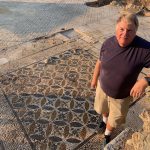From Mundane to Extraordinary: Uncovering Clues to Ancient Life
Nebraska archeologist Michael Hoff claims it’s just as exciting to unearth potsherds and animal bones as, say, to exhume a dumped murder victim or catch ancient Romans engaging in potty humor.
But he admits that finding a million dollars or so in 17th-century pirate booty was pretty exciting.
Hoff, professor of art history, has spent the past 14 summers leading the excavation at Antiochia ad Cragum, an ancient Roman city overlooking the Mediterranean Sea in southern Turkey.

For Hoff, every object helps him imagine the people who once went about their lives there. The object might attract international attention, such as 2018’s discovery of a bawdy mosaic created to entertain users of a public latrine. Or it might be a simple gold hoop earring a woman lost one day down the swimming pool drain.
“We don’t know what we’re going to find. It’s what makes archaeology fun.”
Michael Hoff
But potsherds and other everyday items help Hoff’s team piece together trade routes, diets and how the Roman economy changed over time.
“All these tidbits make the site come alive,” Hoff said. “We don’t know what we’re going to find. It’s what makes archaeology fun.”
Hoff oversees a large excavation program that attracts more volunteers, research staff and students from the United States, Turkey and elsewhere each year. The 2019 program drew 110 people.
Participants continue excavating the site’s structures, including bath houses, a shop-lined street, council house, mausoleum and temple. In 2019, researchers also began exploring the city’s aqueducts and roads to better understand the area’s infrastructure.
And they continued conserving the dead man and pirate treasure, both discovered in 2018. Though they arrived – separately – after Antiochia was abandoned and had become a remote place to stash a body or loot, they’re part of the site’s ongoing human story. What, Hoff wonders, befell the man or the pirate who didn’t return for his staggering load of silver and gold coins?
The Merops Foundation, participation fees and private donations funded the project’s recent field work. St. Olaf College in Minnesota and several Turkish universities are associated with the program.
Additional content
Nebraska news release: Nebraska team discovers ‘extraordinary’ Roman mosaic in Turkey
Media mention: Dirty jokes in latrine mosaics entertained ancient Romans (Live Science, 11/2/2018)
